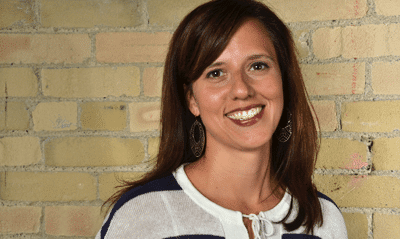Teach Us to Want: An Interview with Jen Pollock Michel

Jen Pollock Michel has written a book that I wish I’d read a long time ago. It’s called Teach Us to Want: Longing, Ambition, and the Life of Faith. A review at The Gospel Coalition says that the book “is an excavator for the heart; it digs into our foundations and helps us plant new roots.” I’m finding the book to be both helpful and enjoyable.

I’m grateful that Jen was willing to answer some questions about the book and about her ministry.
Desire is at the heart of Christian formation, but we tend to focus on belief and behavior more than desire. Why do you think we tend to do this?
We owe our emphasis on rationality to the Enlightenment. When Descartes introduced the idea, “I think, therefore I am,” we began putting cognition at the center of human personality. This philosophical shift affected our theology, and the project of spiritual formation became something very rational. Certainly there are many Scriptures about belief (Romans 10:9, for example), so it’s not unimportant that we believe in Jesus. It’s just that belief must be held in proper balance with what Jesus named as the two most important commandments: love God and love neighbor. These commands make desire central to spiritual formation.
Behaviorism, of course, has long been a part of humans’ attempts at religion. In Jesus’ day, the Pharisees were the ones who measured virtue by externals. They were fastidious about their rule-keeping: washing hands before meals, observing the Sabbath traditions, etc. As long as they could keep their “behaviors” in check, they assumed all was well. But Jesus disagreed, as we know. He called them “whitewashed tombs.”

Teach Us to Want: Longing, Ambition and the Life of FaithBy Jen Pollock Michel
Maybe we all prefer to emphasize belief and behavior in spiritual formation because these suggest something we can more handily manage. We feel in control of our beliefs and behaviors. But the moment we mention desire, suddenly, we’re aware of the deep work of transformation needed. When we talk about desire, it’s as if we put our finger on an exposed spiritual nerve. Do I want Jesus? Is he my greatest treasure? Those are challenging questions we would sometimes prefer to avoid.
Churches that value truth tend to focus on cognitive models of change. Why is this approach insufficient?
I was raised in a church that emphasized Biblical knowledge, and I currently attend a church that emphasizes good theology. I’m grateful for both! But as you’ve said, Biblical knowledge and theology, when viewed as ends rather than means, will prove to be insufficient. We need to know God’s word, and we need to develop good theology. But we need to do both of these in order than our desires for Christ and his kingdom may be formed. Otherwise, we’re on the way toward becoming Pharisees ourselves. Their example reminds us that we can know a lot, even obey very carefully, and somehow miss the divinely intended point. We can strain gnats and swallow camels (cf. Mt. 23:24).
We don’t usually think of The Lord’s Prayer as having much to say about our desires. What made you choose that as your guide?
It’s been many years now that I’ve been studying—and praying!—the Lord’s Prayer. This is funny, I guess. I grew up Baptist, and we certainly did not make it a practice to pray the Lord’s Prayer together! But in my own spiritual life, I’ve loved the prayer for its simplicity. So often, I make things more complicated for myself than they need to be. I tend to get tangled up in my own thoughts. The Lord’s Prayer has been an invitation into what’s most elemental about God’s desires for me and for the world. It’s a prayer I find myself praying a lot, especially when words and understanding fail for a particular situation. When I don’t know how to pray, I remember that Jesus said, “Pray like this!”
But I have to credit Ben Jolliffe, who was an intern at our church for a couple of years, for really shaping the book’s use of the Lord’s Prayer. We were studying the Lord’s Prayer together as a church, and he preached that what we so often get wrong about prayer (and I think, desire) is the tension between, Our Father, and Hallowed by your name. First, there’s this beautiful invitation towards God’s generosity and love when we call him our Father. Jesus is saying, “Ask! You can’t believe how much God wants to give!” But right on the heels of this invitation is this necessary caution: God’s name must be made holy. Don’t ask thinking God owes you your wildest dreams.
When I heard that sermon, I had been working on the book already, but it gave me really clear language for the tension of human desire in the context of faith. We should want from God because he is so unbelievably good. And yet, we should want very soberly, knowing that God isn’t dedicated to the project of making our lives easy and convenient. Instead, he’s committed to his kingdom, his own glory.
How has a deeper understanding of desire changed your approach to your own spiritual growth?
I use the question, “ What do I want?” as a way forward into understanding my own heart. Here’s an example: maybe I’ve been irritable with the kids. It’s easy enough to confess that irritability. But maybe there’s something worthwhile about digging into the desires, which promote that irritability. Maybe there are good desires that are being obstructed. Maybe one of my children is being persistently disobedient, and God is calling me into greater courage and consistency in my parenting. But maybe I have disordered desires, which need to be confessed. Maybe it’s my insane craving for quiet and order that makes me irritable, and I need to embrace that my children are children and not adults! As I understand what I want, for good or for bad, it informs the way I pray and then act.
Here’s another example: in my marriage, maybe I want greater intimacy with my husband. But maybe I also want to avoid the real work of participating in that growth. Maybe in asking myself the question, “What do I want?” I recognize that at the end of the day, I’m most interested in crawling into bed with a good book!
When I pray, considering my desires, I can see my heart’s contradictions and bring these before God for healing. I don’t ever trust myself to change my desires. I simply look for God’s grace to be active in their transformation. I ask him to help me want and will what he wants and wills.
How can we pray for you?
Thank you for this question! Right now, I’m feeling a strong sense that there are important “nos” I must say in order to be faithful to God. Often, we think of calling as the “yeses” we commit to God. But as I’m learning, every “yes” requires many more “nos.” I’d love to have the courage for the “nos.” I confess to wanting to please people, and this often leads me to agree to do things I have no business committing to. Also, I love feeling very indispensable to God’s plans, and there’s nothing that feeds my pride more than that kind of self-importance. Please pray that my desires will be formed for the approval of Christ alone!
Thanks, Jen!
Check out Jen’s excellent blog, and read more about her book at Amazon.com and Amazon.ca.






